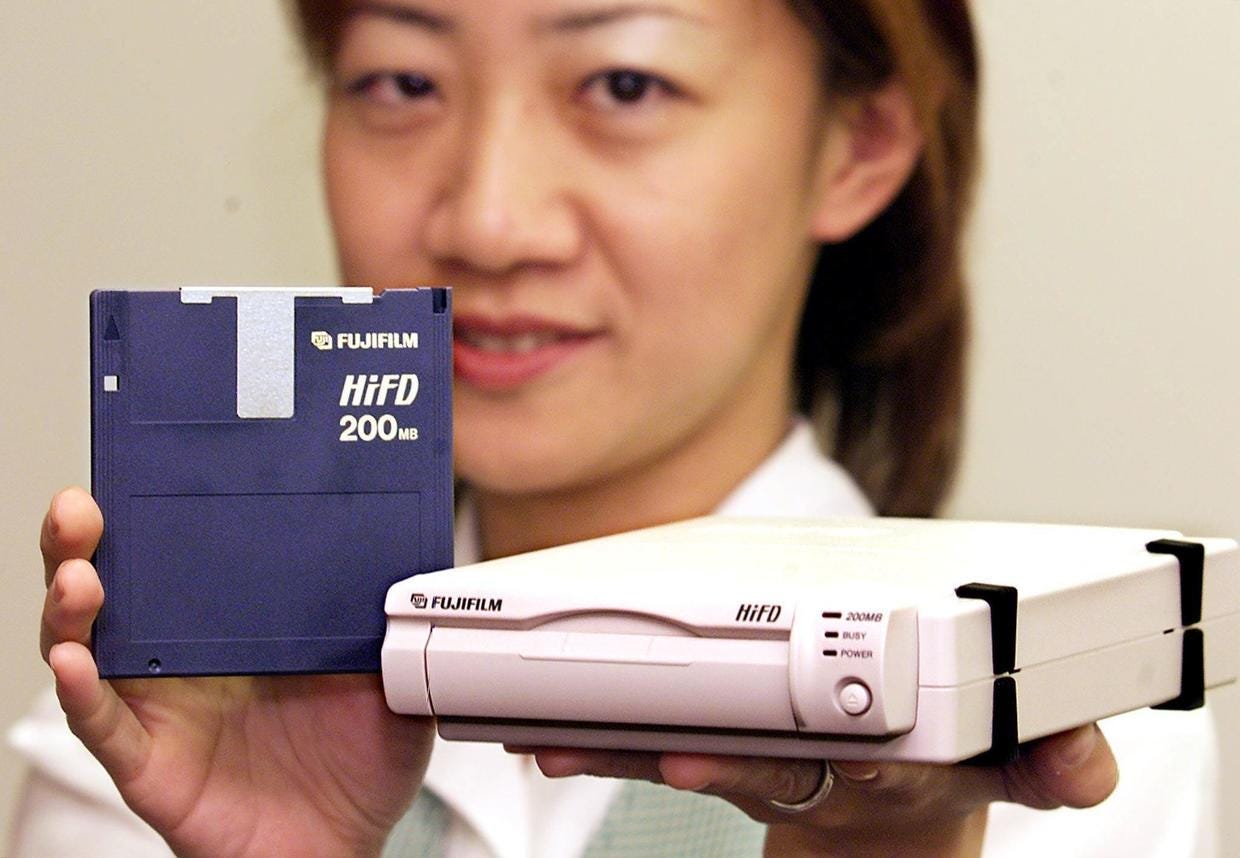The low-tech reality of high-tech Japan
Floppy disks anyone?
Dear readers, three years ago I posted a story about how life in Japan was not as comfortable and high-tech as people abroad imagined. A couple of days ago I was reminded of that piece when I read Pallavi Aiyar’s story about floppy disks, faxes, and other examples of low-tech life in 21st century-Japan. Pallavi’s article was so good and funny that I’m reposting it here. Pallavi’s newsletter, but the way, offers consistently interesting and thought-provoking writing about life in Japan, India, China and many other things. Check it out.
In the popular imagination, Japan is a high-tech conurbation of robots and gadgets. In reality, living there can feel like being stuck in the 1980s, when fax machines were haute-tech and neon passed for cutting-edge. It is within this context that the headline currently dominating Japanese newspapers makes sense: the archipelago has bid sayonara to…drum roll…floppy disks.
Until last month, businesses in Japan were still required to use floppies to complete 1,900 government-related procedures such as submitting applications and other documents. The Digital Minister, Taro Kono, had declared war on these disks back in 2021, when the COVID pandemic had underscored, just how analogue Japan was and why this was a problem.
I lived in Japan between 2016 and 2020, an experience that had given me firsthand insight into the chasm between the country’s high-tech reputation and low tech quotidian. In neighboring countries like China, even beggars had begun to use QR codes for receiving alms, but in Japan it wasn’t unusual for me to dine in a restaurant only to discover that it did not accept credit cards.
Waiters were often dressed in full livery, coat tails and all, but when confronted with a malfunctioning card payment terminal (if one happened to be available), they gawped as though beholding complex satellite machinery. Taxi drivers wore white gloves and thanked passengers for their custom with rhetorical flourish, but the Japan Taxi App remained the world’s most byzantine and least economical.
The country could come across like an upper-class spinster from a historical novel, with impeccable manners who spent the days dabbing the edges of her mouth with a linen napkin while internally tutting at the uncouth dining etiquette of today’s upstarts, id est: the Chinese!
It had taken me ten days to open a bank account, a process that required a mountain of paperwork to rival Mt Fuji. Making online payments had involved physical trips to the bank every time a new payee had to be added.
(My book on Japan: Orienting is available for order here)
In 2018, Yoshitaka Sakurad, the deputy head of the government’s cyber security panel admitted to never having used a computer in his professional life. Now, in normal times it was just possible to rose-wash the requirement to fax in information requests to government offices as endearingly quaint. But after COVID-19, the deleterious impact of Japan’s failure to embrace digital transformation was amplified.
One major lacuna exposed by the pandemic was Japan’s backwardness in telemedicine. For years, the government had failed to approve measures like remote medical exams for first-time patients, in part due to opposition from lobbies like the Japan Medical association. Covid finally prodded the authorities to lift some of these restrictions, but an array of hurdles remained. Many Japanese clinics still don’t accept credit card payments, the most basic building block of telemedicine. According to an article in the Nikkei Asian Review, 65 percent of patient health records are kept in hard copy.
In March 2020, Tokyo declared a state of emergency and people were told to stay at home and work remotely. It quickly became clear that most companies were ill equipped to facilitate telework. Surveys showed that almost 50 percent of corporations had no systems in place to allow staff to work from home. Many employees did not have laptops at home (even though a third of Japanese households had fax machines).
The hanko, or personalized carved seal, emerged as the greatest obstacle to social distancing. Most official documents in Japan still require the physical stamp of a company hanko, which is expected to remain in the office. Consequently, the most commonly cited reason for people not following work-from-home edicts was the need to go in to stamp documentation.
The war on floppies isn’t the only one that Japan declared in the aftermath of Covid. Both fax machines and the hanko were also taken on by Kono. In 2021, government ministries were asked to end hanko requirements for hundreds of procedures, including year-end tax adjustments and tax returns. Yet, the use of both faxes and hankos remains widespread.
Japan’s is a deeply conservative society and there has been push back to Kono’s attempted digital revolution from an entrenched bureaucracy who are loathe to change – well, anything. Media reports cited hundreds of government offices claiming that getting rid of fax machines would be “impossible,” given the “anxiety over the communication environment” were a switch made to email.
Floppy disks have their champions, as well. The disks “almost never broke or lost data”, Yoichi Ono, an official in Tokyo’s Meguro ward, waxed nostalgic to Nikkei Asia in 2021, when the local government first decided to phase out floppies.
Which is why Kono’s statement last week, “We have won the war on floppy disks!" is likely inaccurate.



Good article!
I wonder how many people in the West under 30 have ever seen the following, still regularly seen in the wild.: Betamax or cassette decks, or even CD players. I was at my local ward office the other day, they have a VHS player hooked up to the TV to amuse the waiting masses.
(And there's always the foreign businessman realizing just before they set off for Japan that they need to print up some business cards...)